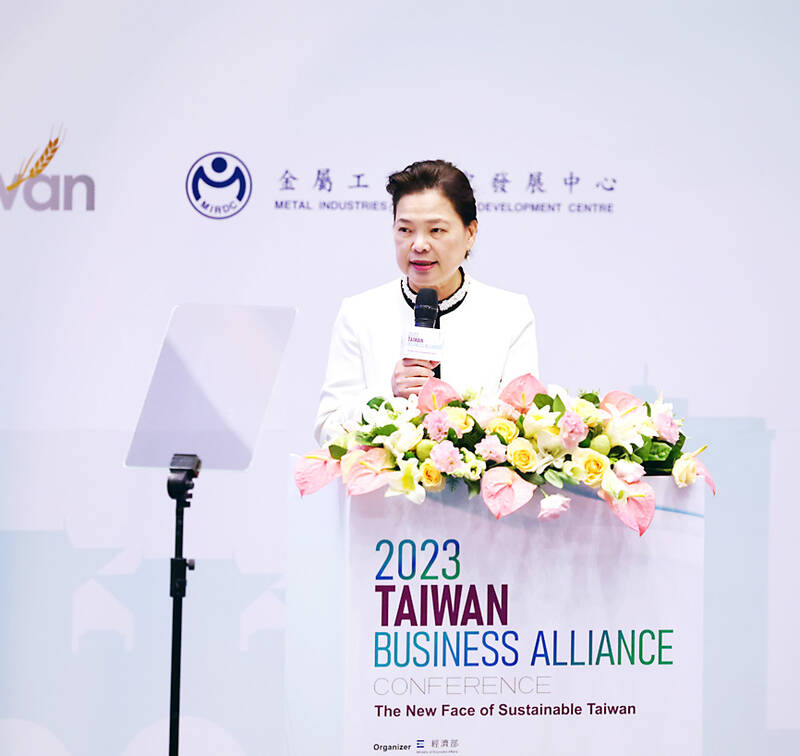Ten foreign companies have signed letters with the Ministry of Economic Affairs, confirming their intention to invest nearly NT$90 billion (US$2.86 billion) between them in Taiwan over the next three years.
The agreements were signed at an annual global investment forum in Taipei and were announced on Monday by Minister of Economic Affairs Wang Mei-hua (王美花).
The companies include French industrial gas firm Air Liquide SA; Lam Research Corp, a US manufacturer of equipment used to make semiconductors; and Nitto Denko Corp, a Japanese manufacturer of insulating materials, Wang said.

Photo: CNA
US industrial gas company Air Products and Chemicals Inc, and Air Liquide Far Eastern Ltd (亞東工業氣體), a joint venture established in 1987 by Air Liquide and Far Eastern Group (遠東集團), plan to expand their operations in Taiwan, Wang said.
Japanese firm Fujifilm Electronic Materials Co plans to build a factory for advanced manufacturing, Lam Research is to build a research and development (R&D) center for high-end technologies, and British semiconductor company IQE PLC plans to expand its R&D facility in Hsinchu, she said.
The others intending to expand their presence in Taiwan are South Korean e-commerce company Coupang Inc, Japanese retailer Muji and Zacros, Japan’s leading manufacturer of single-use bags, the ministry said.
The letters represent concrete action by the 10 companies, showing their confidence in Taiwan’s investment environment, Wang said.
Over the past three years, international companies have invested more than US$3.3 billion in Taiwan, she said.

Semiconductor business between Taiwan and the US is a “win-win” model for both sides given the high level of complementarity, the government said yesterday responding to tariff threats from US President Donald Trump. Home to the world’s largest contract chipmaker, Taiwan Semiconductor Manufacturing Co (TSMC, 台積電), Taiwan is a key link in the global technology supply chain for companies such as Apple Inc and Nvidia Corp. Trump said on Monday he plans to impose tariffs on imported chips, pharmaceuticals and steel in an effort to get the producers to make them in the US. “Taiwan and the US semiconductor and other technology industries

CHIP WAR: Tariffs on Taiwanese chips would prompt companies to move their factories, but not necessarily to the US, unleashing a ‘global cross-sector tariff war’ US President Donald Trump would “shoot himself in the foot” if he follows through on his recent pledge to impose higher tariffs on Taiwanese and other foreign semiconductors entering the US, analysts said. Trump’s plans to raise tariffs on chips manufactured in Taiwan to as high as 100 percent would backfire, macroeconomist Henry Wu (吳嘉隆) said. He would “shoot himself in the foot,” Wu said on Saturday, as such economic measures would lead Taiwanese chip suppliers to pass on additional costs to their US clients and consumers, and ultimately cause another wave of inflation. Trump has claimed that Taiwan took up to

A start-up in Mexico is trying to help get a handle on one coastal city’s plastic waste problem by converting it into gasoline, diesel and other fuels. With less than 10 percent of the world’s plastics being recycled, Petgas’ idea is that rather than letting discarded plastic become waste, it can become productive again as fuel. Petgas developed a machine in the port city of Boca del Rio that uses pyrolysis, a thermodynamic process that heats plastics in the absence of oxygen, breaking it down to produce gasoline, diesel, kerosene, paraffin and coke. Petgas chief technology officer Carlos Parraguirre Diaz said that in

Japan intends to closely monitor the impact on its currency of US President Donald Trump’s new tariffs and is worried about the international fallout from the trade imposts, Japanese Minister of Finance Katsunobu Kato said. “We need to carefully see how the exchange rate and other factors will be affected and what form US monetary policy will take in the future,” Kato said yesterday in an interview with Fuji Television. Japan is very concerned about how the tariffs might impact the global economy, he added. Kato spoke as nations and firms brace for potential repercussions after Trump unleashed the first salvo of